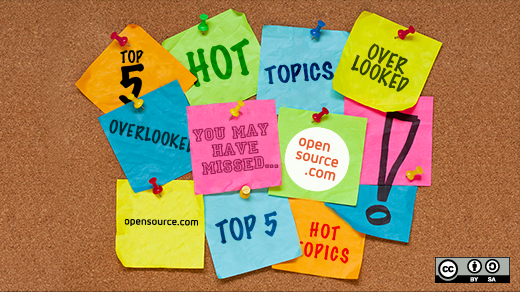Welcome to halftime in 2017.
We've published more than 50 articles about open organizational culture and open leadership so far this year, and our community shows no sign of slowing its pace. As we turn toward the second part of this incredibly fruitful trip around the sun, let's recount the most-read stories we've shared with one another.
5. A lesson in accountability from my Uber driver
In March, Sam Knuth hopped a car to the airport—and received a 22-minute lesson in organizational accountability while on board. Sam's rumination on crafting a career in the era of the gig economy was immediately popular with readers. "Your manager or HR department can't create your career path for you," he says. "What dictates your career growth more than anything else is the initiative you take, the learning you exhibit and apply, the outcomes you achieve, the problems you help to solve, the things you do to help the company achieve its goals."
4. A user's guide to failing faster
Fail fast, often, and well. That was Gordon Haff's advice in April for anyone seeking to foster a spirit of experimentation in an open organization. Gordon's piece struck a chord with readers, who clearly appreciated his outline of five principles that guide construction of flexible, adaptive systems.
3. What to do when people start hacking your culture
Hackers-at-heart love to bend rules playfully. But what happens when people take aim at the tacit system of rules governing your community's behavior—its culture? In Feburary, Simon Phipps offered one answer to that question. It involved an in-depth examination of organizational governance at the Apache Software Foundation. "Any stable system of organizational rules creates a gaming space proportional to the number of rules and the length of time they have been in operation," he reminds readers.
2. What's the point of DevOps?
DevOps may be all the rage in forward-thinking and open-minded IT organizations, but in May, Matt Micene distanced himself from the hype and posed a simple question: "What's the point of DevOps?" His answer wound its way through 20th century management theory and organizational design. "The 'Dev' and 'Ops' split is not the result of personality, diverging skills, or a magic hat placed on the heads of new employees; it's a byproduct of Taylorism and Sloanianism," he writes. This one spread across Twitter like wildfire.
1. 5 laws every aspiring DevOps engineer should know
Penned exclusively for the Open Organization Guide to IT Culture Change, Chris Short's treatise on agility-focused software engineering explained the importance of continuous learning. "Great DevOps engineers constantly seek answers to questions and solutions to problems," Chris says. "To become one of them, make preventing future technical debts a constant focus of your work. Never stop learning." Readers learned enough from Chris that they made his piece the most-read article of 2017—so far, that is.
Bonus
Five articles aren't enough? That's understandable. In that case, here are the next five most-read stories from the first half of 2017.
- What your code repository says about you, by Lauri Apple
- Want to be a great leader? Assume positive intent, by Jim Whitehurst
- How Socrates taught me to talk to developers, by Lauri Apple
- Why we need open leaders more than ever, by Philip Foster
- A new perspective on meritocracy, by Brook Manville






Comments are closed.